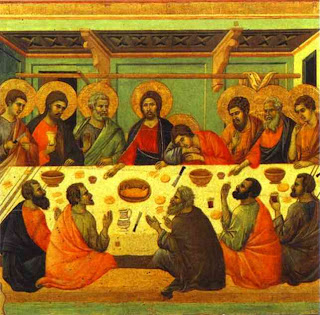


The Last Supper of the Last Week of Jesus' life...
What does the Lord's Supper mean to you? What does it mean to our church?
When Jesus says, "Do this in rememberance of me." what is it we are doing? What is the "this" in his command?
Luke 22:14-29
Luke 22:14-23:56
22:14 When the hour came, he took his place at the table, and the apostles with him.
22:15 He said to them, "I have eagerly desired to eat this Passover with you before I suffer;
22:16 for I tell you, I will not eat it until it is fulfilled in the kingdom of God."
22:17 Then he took a cup, and after giving thanks he said, "Take this and divide it among yourselves;
22:18 for I tell you that from now on I will not drink of the fruit of the vine until the kingdom of God comes."
22:19 Then he took a loaf of bread, and when he had given thanks, he broke it and gave it to them, saying, "This is my body, which is given for you. Do this in remembrance of me."
22:20 And he did the same with the cup after supper, saying, "This cup that is poured out for you is the new covenant in my blood.
22:21 But see, the one who betrays me is with me, and his hand is on the table.
22:22 For the Son of Man is going as it has been determined, but woe to that one by whom he is betrayed!"
22:23 Then they began to ask one another, which one of them it could be who would do this.
22:24 A dispute also arose among them as to which one of them was to be regarded as the greatest.
22:25 But he said to them, "The kings of the Gentiles lord it over them; and those in authority over them are called benefactors.
22:26 But not so with you; rather the greatest among you must become like the youngest, and the leader like one who serves.
22:27 For who is greater, the one who is at the table or the one who serves? Is it not the one at the table? But I am among you as one who serves.
22:28 "You are those who have stood by me in my trials;
22:29 and I confer on you, just as my Father has conferred on me, a kingdom,
The danger of lost meaning for the Communion? How do we live out the Last Supper amongst our neighbors. What meaning does the Last Supper have for our neighbor if we do not, as the Lord's table reads, do this in "rememberance" of Him? What meaning remains for us if we do not "remember?"



